Dal Fry is a delicious and popular Indian lentil recipe that is made with arhar dal (tuvar or toor dal in Hindi and pigeon pea lentils in English) together with onions, tomatoes, herbs and spices. Relish our favorite dal recipe that is flavorful, mildly-spiced and creamy with roti, naan or your favorite steamed rice. I share 3 ways of making Dal Fry Recipe – stovetop pressure cooker method with stepwise photos, while the pan and Instant pot method are mentioned in the recipe card.
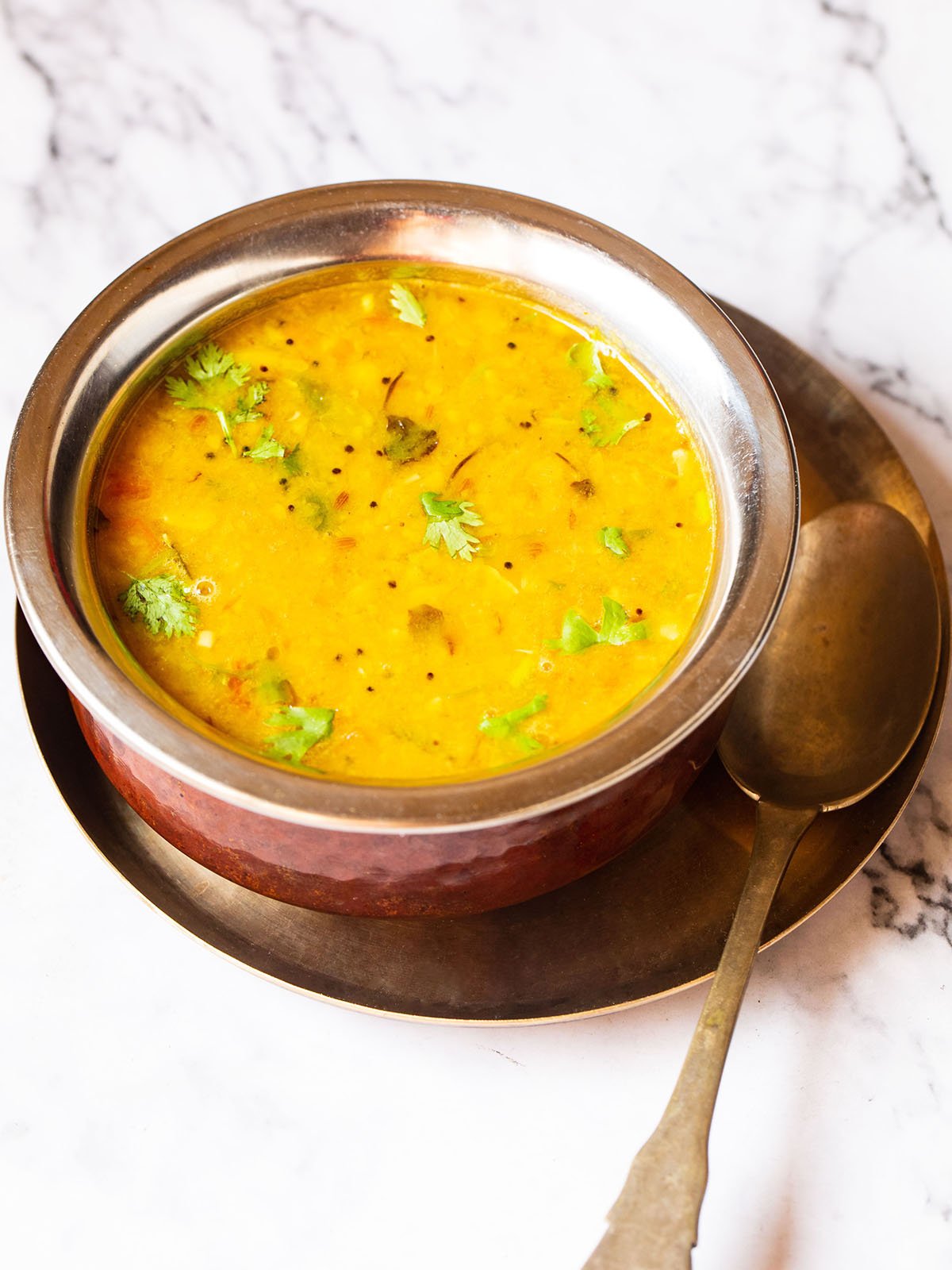
About Dal Fry Recipe
In Hindi language, ‘dal’ or ‘dahl’ is the generic term for lentils as well as the recipes made from lentils. Dal or lentils are a staple in Indian cuisine and make for an excellent plant-based source of protein.
Dal Fry is a dish that is made in various ways in many Indian homes with tuvar dal or pigeon pea lentils.
If you are new to Indian cuisine, you may think that the words ‘dal fry’ indicate that some ingredients are being deep fried or the lentils are fried. Let me assure you that we don’t fry anything in a dal fry.
Here is how we make it. First, the lentils are cooked until soft and mushy. Note that we do not cook al dente lentils.
Table of Contents
The soft-cooked lentils or dal is then mixed with a sautéed base mixture of spices, onions, tomatoes and herbs. Then simmered for a few minutes until you get the desired consistency.
In the Indian terminology, we often use the word ‘fry’ for ‘sautéed’ and hence the term dal fry. Though technically speaking nothing is deep fried or shallow fried.
Why I love This Dal Fry
My Dal Fry recipe offers you a lot of restaurant-like flavors and you will love it to relish with some roti or rice or paratha or even with tandoori roti.
It is usually prepared with arhar dal, also known as toor, toovar (yellow lentils) or pigeon pea lentils.
I like to use an equal mix of masoor dal (pink or orange lentils) and tuvar dal (pigeon pea lentils), but this recipe is easily adaptable with any lentils you have in your pantry. But I highly recommend to use lentils which are in their shelf life.
The apt and fitting inclusions of the various ingredients that go into making of this Dal Fry recipe give it a restaurant style flavor.
To add more, you can smoke the Dal Fry with charcoal. I have mentioned in detail about this smoking technique in my Dal Tadka Recipe which you can have a look at.
I usually cook the lentils in a stove-top pressure cooker, but you can cook them in a pan or in an Instant Pot if you do not have a stovetop pressure cooker on hand. Details are given in the recipe card below.
Lentil recipes like these are famous in the Dhabas (highways and roadside eateries) in India, though the Dhaba Dal served in the Dhabas has a different taste and flavor than this dal recipe.
Essential Ingredients
I use ingredients that are easily available in an Indian kitchen. If you do not have these ingredients, then buy them online or from an Asian or Indian grocery store.
- Veggies: You will need an onion and tomato, both finely chopped for this dal recipe.
- Green Chilies: Not as hot as jalapeños but just the right level of spice for the dish.
- Curry Leaves: The subtle flavor of curry leaves are essential in this recipe. But if you don’t have it, then might well as skip it – though some flavor profile will be amiss.
- Asafoetida Powder (hing): If using a strong asafoetida, then just one pinch is enough. I would definitely recommend adding a small amount at a time and seasoning to taste. And if you do not have asafoetida, then simply skip it.
- Coriander leaves (cilantro): This simple herb brings a much needed hint of freshness to the Dal Fry.
- Kasuri Methi (dry fenugreek leaves): Brings restaurant style flavors to the dal and gives a nutty aroma. Skip if you do not have it.
- Additional Seasonings: You will also need several Indian pantry staples, including ginger, black mustard seeds, cumin seeds, turmeric powder, red chili powder, Garam Masala powder, oil, lemon juice, and salt.
How to Make Dal Fry
Cook Dal
1. Rinse your lentils in water for 3 to 4 times. I would recommend using ½ cup tuvar dal (arhar dal or pigeon pea lentils) or ¼ cup each of tuvar dal and masoor dal (pink or orange lentils).
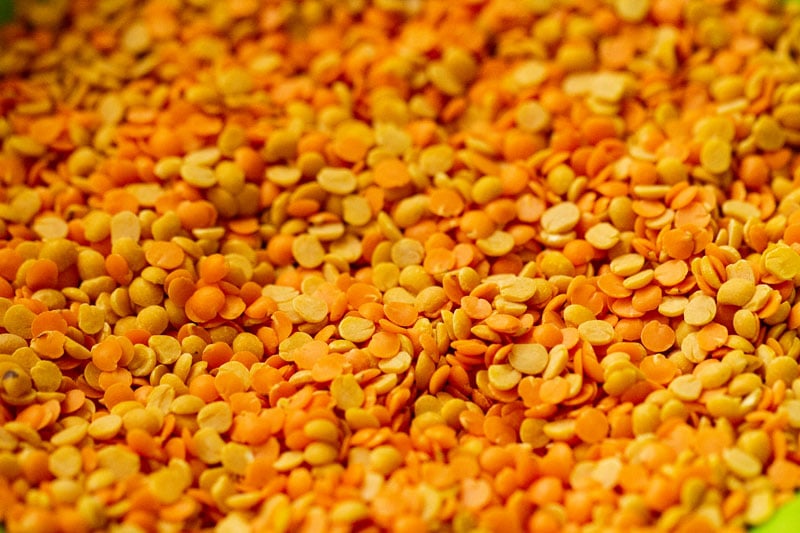
2. After rinsing, pour the lentils into a 2-liter pressure cooker and toss in a pinch of turmeric powder and 1.5 cups of water.
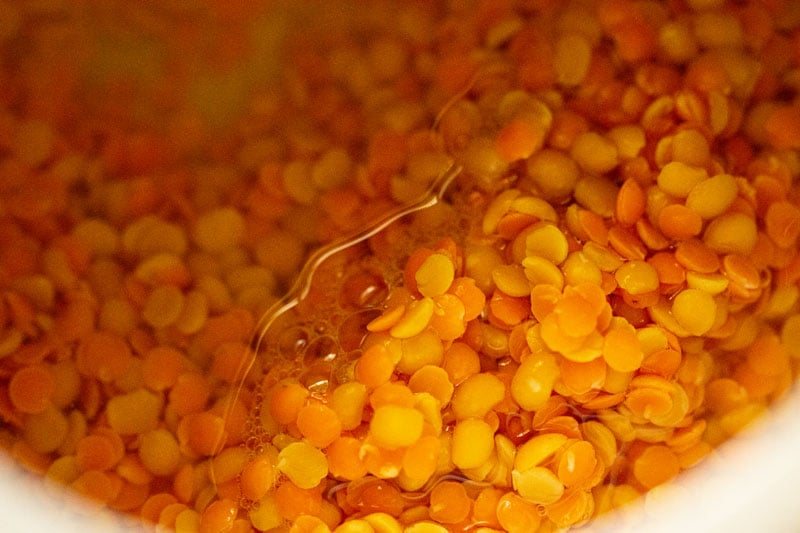
3. Pressure cook the lentils for 9 to 10 minutes on medium heat, or until they are thoroughly cooked and completely soft. Once lentils are cooked, mash them with a spoon or wired whisk, then set aside.
Tip: You can see the consistency of the cooked lentils in the photo below. It is important to note that there should be no separate grains visible.
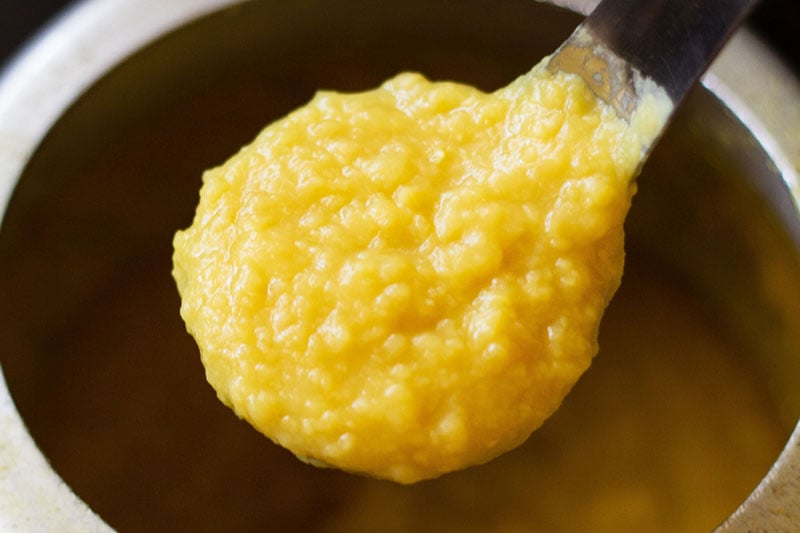
Sauté Onions, Tomatoes, Spices
4. Heat 2 to 3 tablespoons of oil, ghee or unsalted butter in a pan or skillet. Once hot, add ½ or ¾ teaspoon of black mustard seeds.
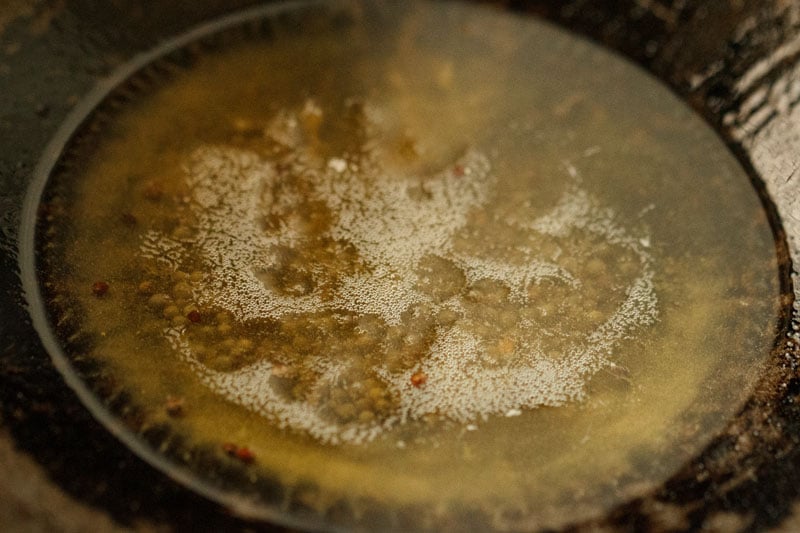
5. When you hear the mustard seeds start crackling, add 1 teaspoon of cumin seeds and fry them with the mustard seeds for several seconds or until they change color.
You should hear the same crackle for the cumin seeds!
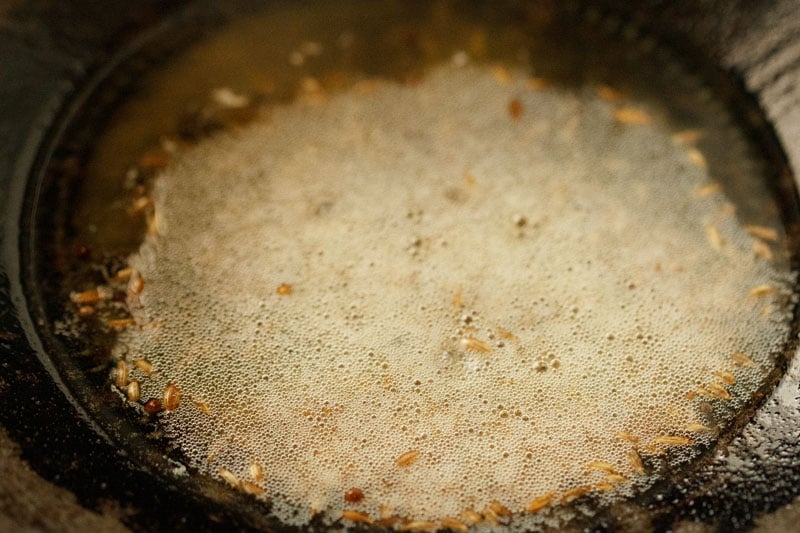
6. With the mustard and cumin seeds still in the pan, add ⅓ cup of chopped onions.
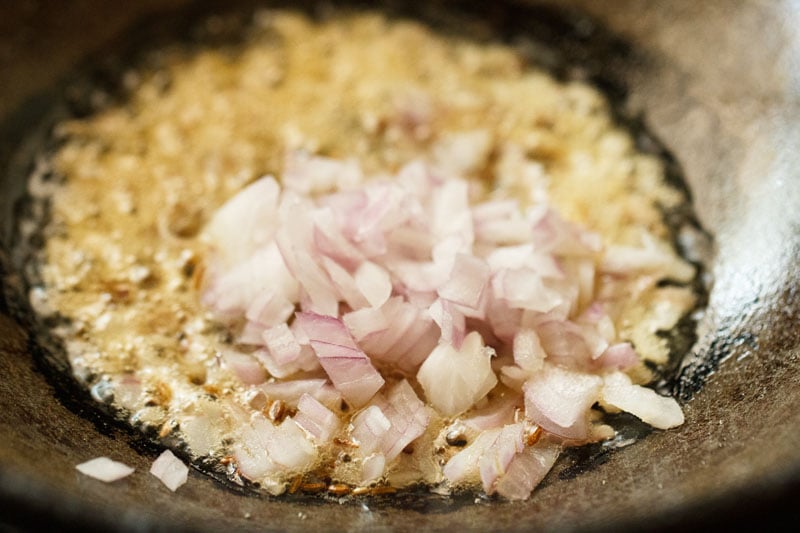
7. Sauté the seeds and onion mixture until the onions become translucent or lightly browned.
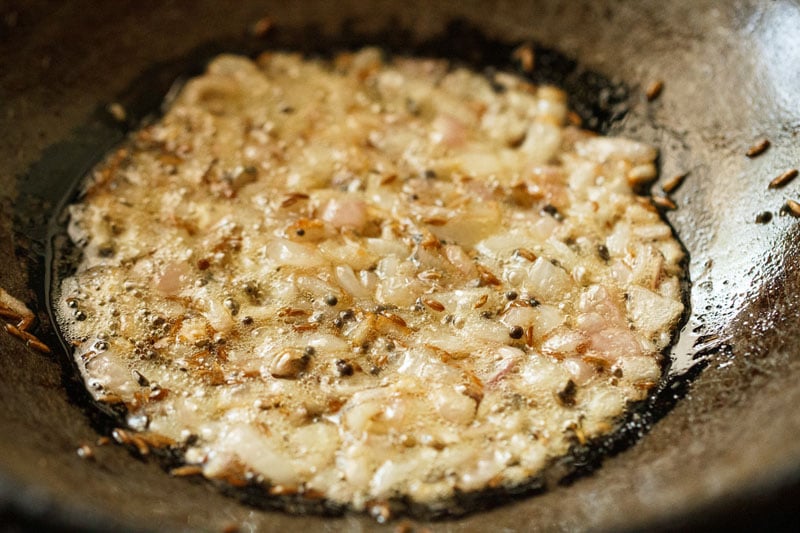
8. When the onions have lightly browned, add in 1 to 1.5 teaspoons ginger-garlic paste and stir to combine. Sauté the mixture for a few seconds or until the raw aroma of the ginger-garlic goes away on a low heat.
Tip: Make your own paste by combining 1 inch ginger with 3 to 4 medium-sized garlic cloves, crushed to a paste in a mortar-pestle.
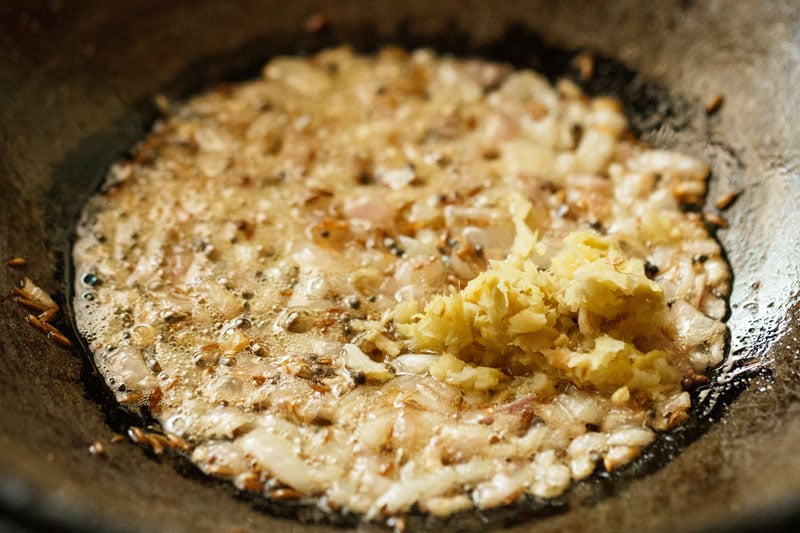
9. Finally, add in 10 to 12 curry leaves, 2 to 3 dry red chilies, and 1 to 2 green chilies. Stir to combine with the ginger-garlic paste mixture.
Tip: You can skip the curry leaves if you don’t have them! I always like to add curry leaves, as they add such a nice flavor to the dish.
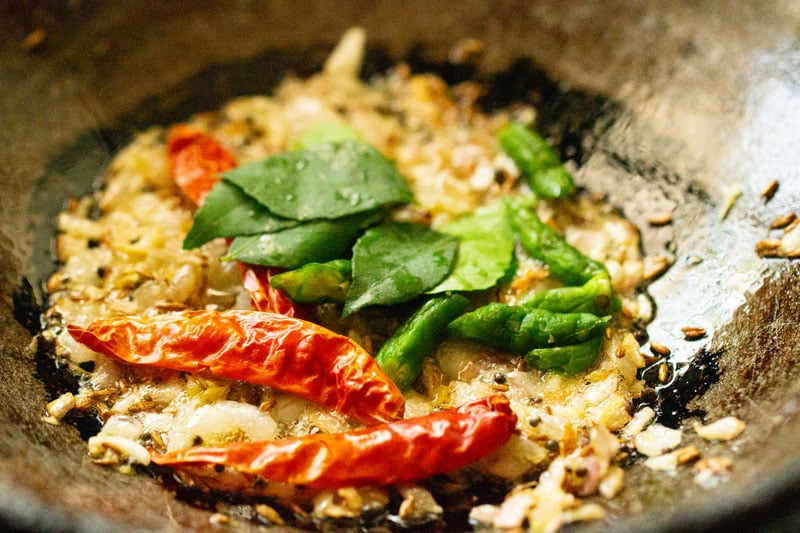
10. Mix well on a low heat, stirring to combine the flavors.
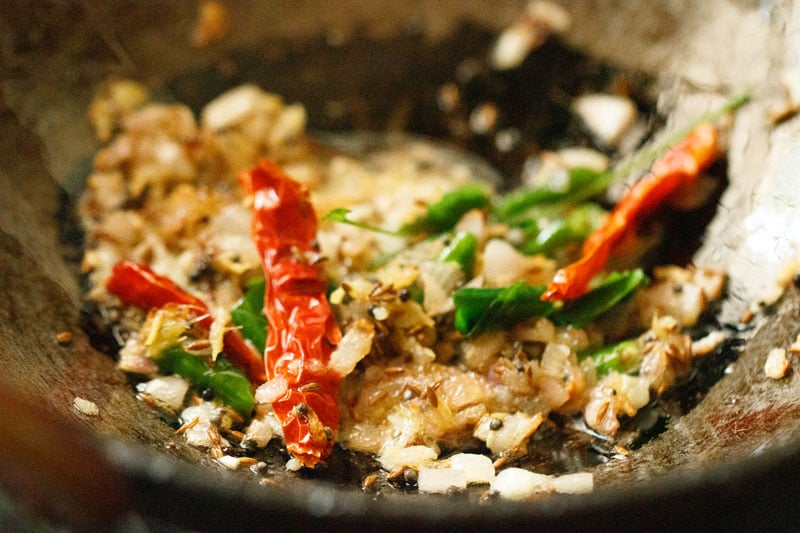
11. Add all the spice powders and mix again!
- ½ teaspoon turmeric powder (ground turmeric)
- ½ teaspoon red chili powder or cayenne or smoked paprika (For a light smoky flavor)
- 1 to 2 pinches of asafoetida, or hing (Skip if you do not have it.)
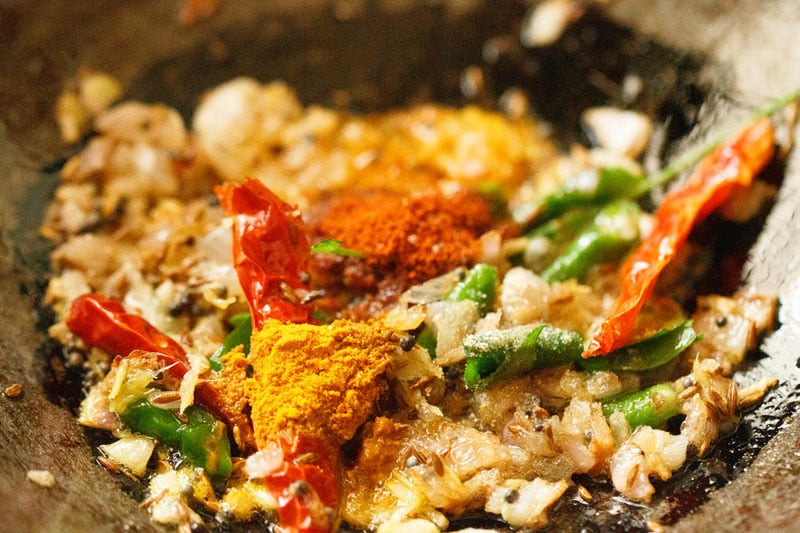
12. After mixing thoroughly, add about ⅓ to ½ cup of finely chopped tomatoes.
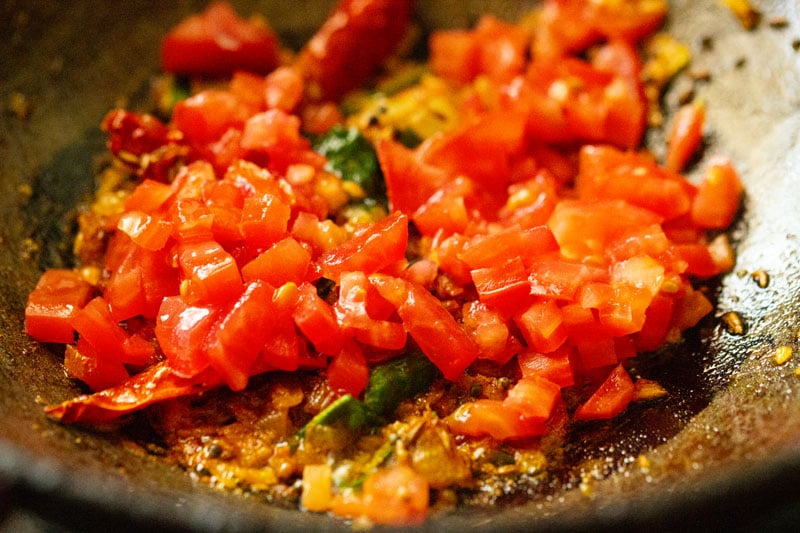
13. Stir together one more time and continue to sauté until the tomatoes become soft and pulpy.
The oil should also start to leave the masala mixture, which is an indication that the onion-tomato base mixture is fully cooked.
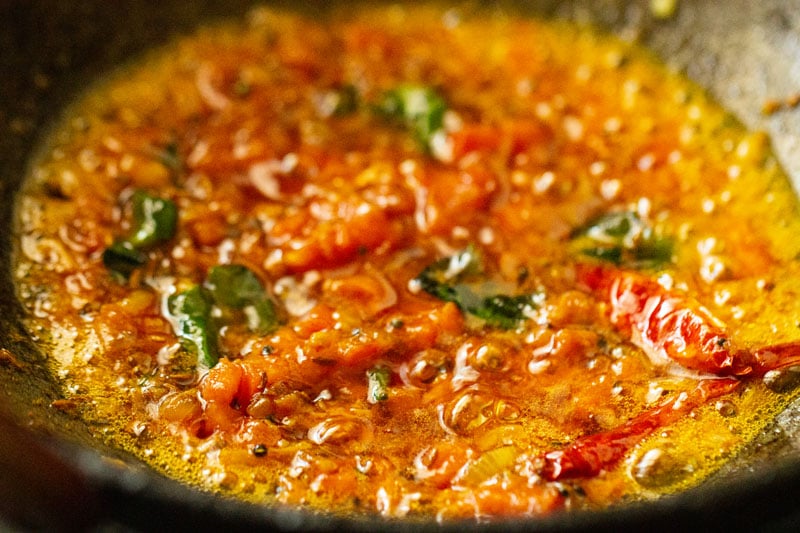
Make Dal Fry
14. Add your mashed lentils to sautéed onion-tomato masala mixture in the pan or skillet.
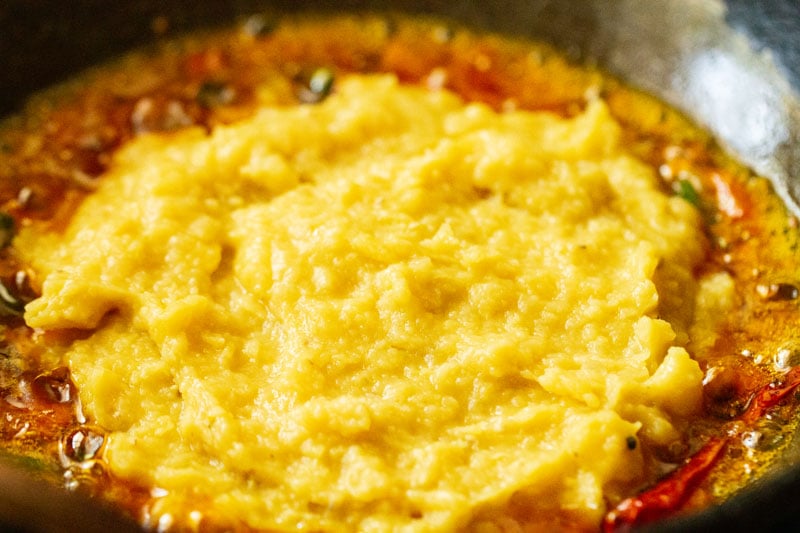
15. Combine and mix everything evenly with the rest of the masala mixture.
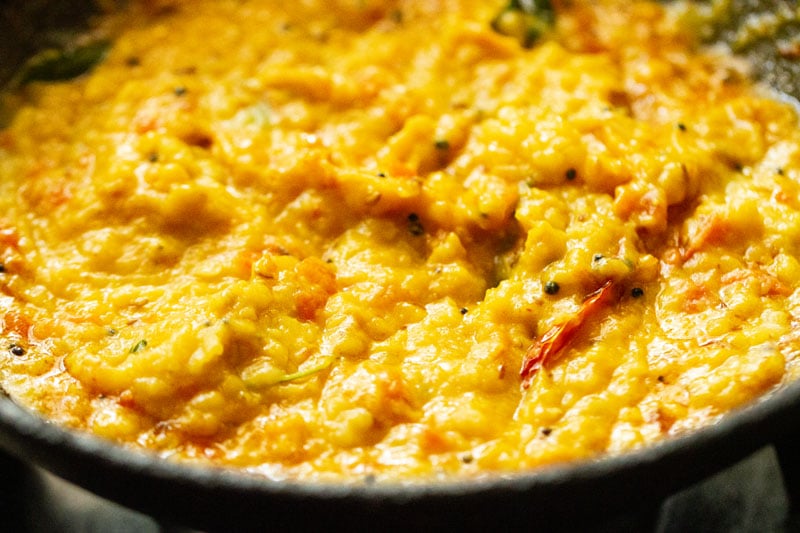
16. Pour 1 to 1.5 cups of water. You can adjust the consistency of the dal by adding more or less water as per your taste preferences.
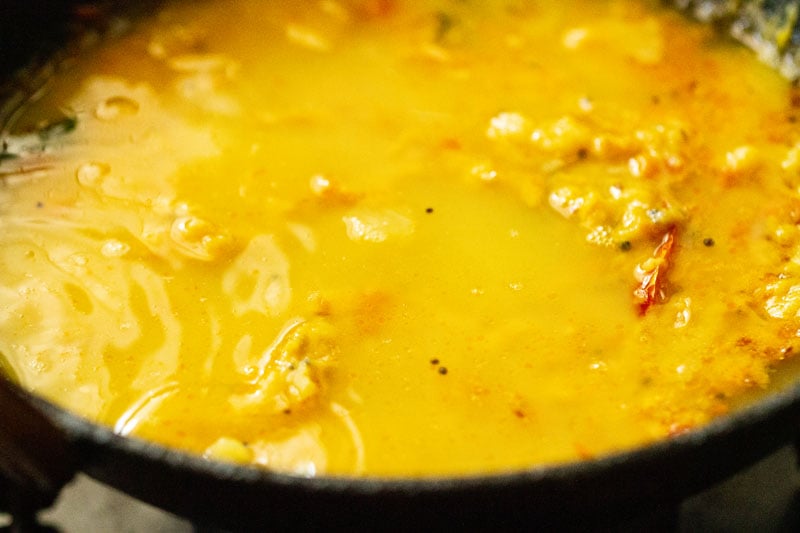
17. Mix and stir thoroughly to get a smooth and even consistency.
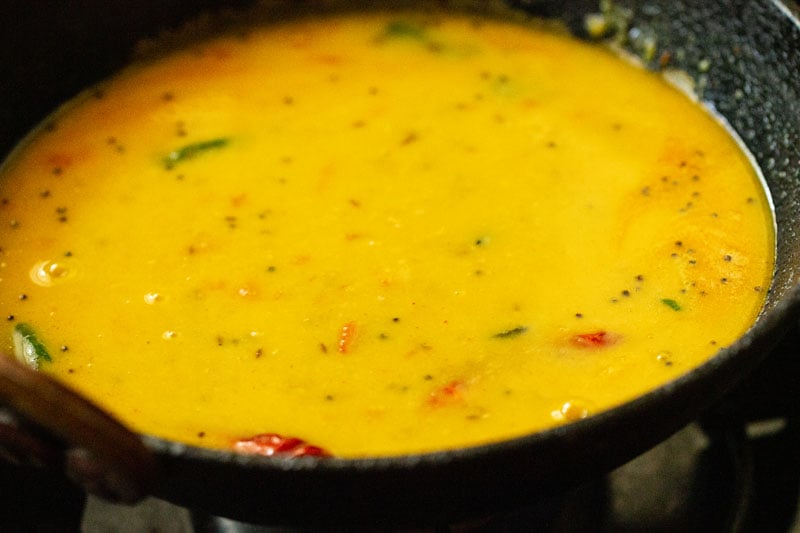
18. Season with salt as per taste. Stir and mix again.
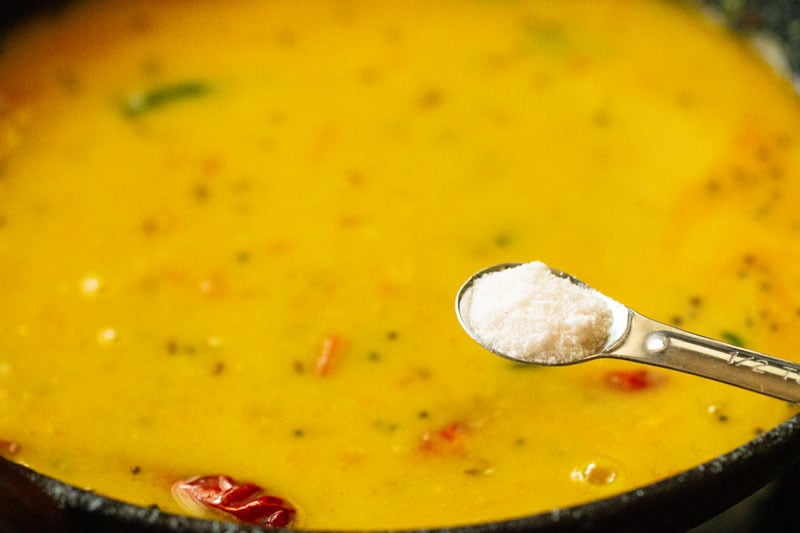
Simmer Dal Further
19. Simmer for 5 to 6 minutes on low to medium heat. Stir occasionally, so that the lentils do not stick to the bottom of the pan.
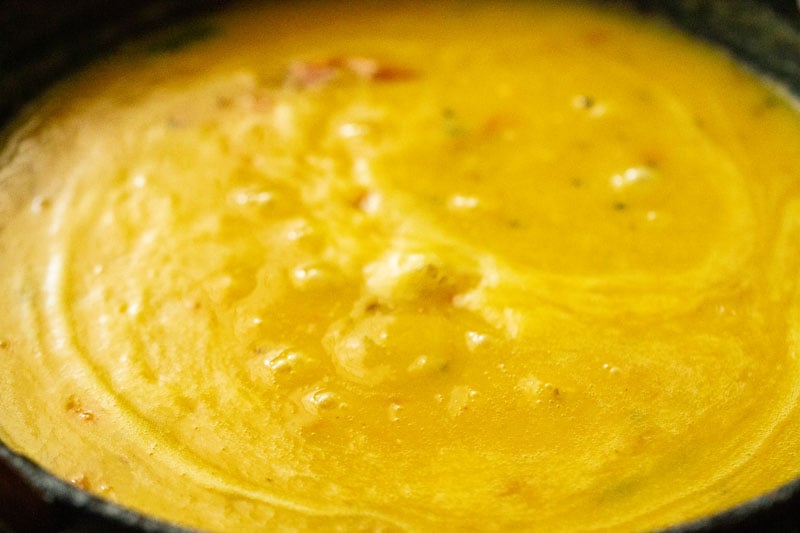
20. Add 1 teaspoon of crushed kasoori methi (dried fenugreek leaves) and sprinkle ¼ to ½ teaspoon of garam masala powder.
Tip 1: You can substitute kasoori methi with a pinch of fenugreek seeds powder. If you don’t have either, then just skip this step.
Tip 2: If you are using homemade or a more intense garam masala, then add ¼ teaspoon.
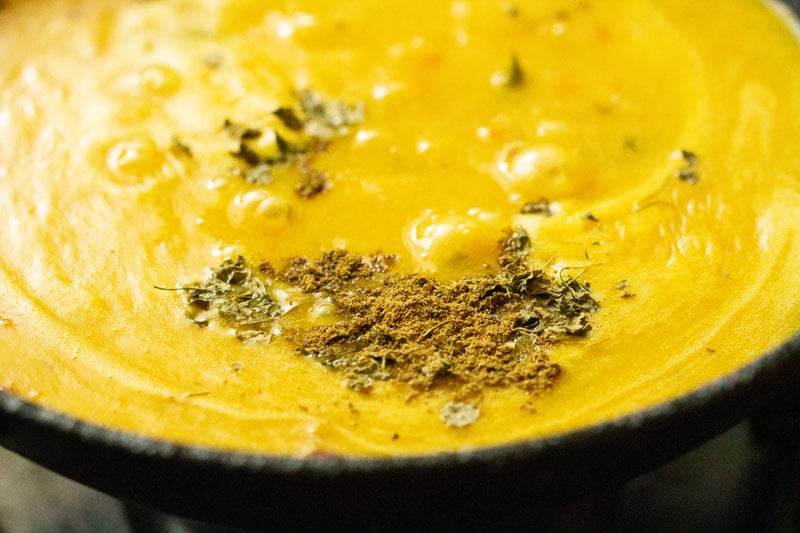
21. Stir and simmer for 1 minute.

22. Turn off the heat and add 2 tablespoons of chopped coriander leaves. You can also add ½ to 1 teaspoon lemon juice at this step for a little added freshness and tang.
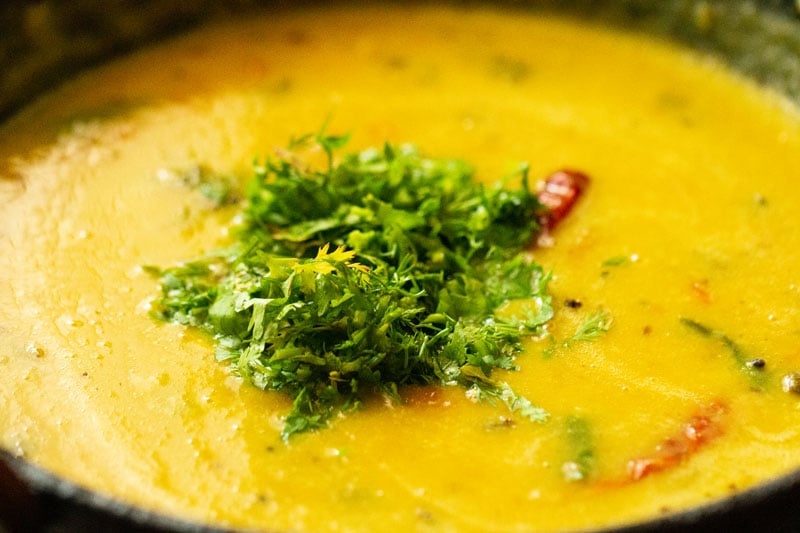
23. Stir just one last time.
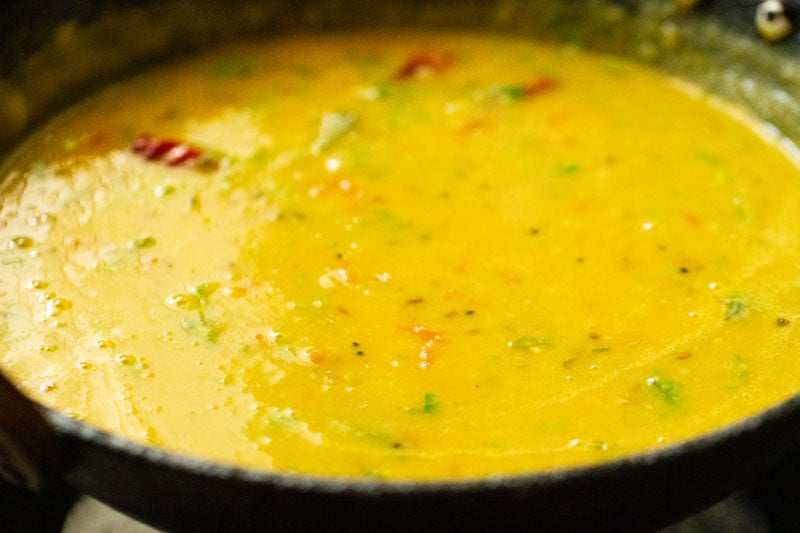
Serve Dal Fry hot or warm with paratha, roti, jeera rice or plain steamed basmati rice accompanied with an optional Onion Raita, papad, lime/lemon slices or mango pickle or onion salad or the favorite Kachumber Salad.
You can also opt to garnish with some more coriander leaves while serving.
For the best taste and flavor consume it as soon as it is prepared. On reheating you will need to add a bit of water.
I do not recommend to refrigerate or store the dal overnight or for a day as lentils are best eaten when freshly cooked and have optimum health benefits. Moreover on refrigerating the flavor and consistency of the lentils change considerably.
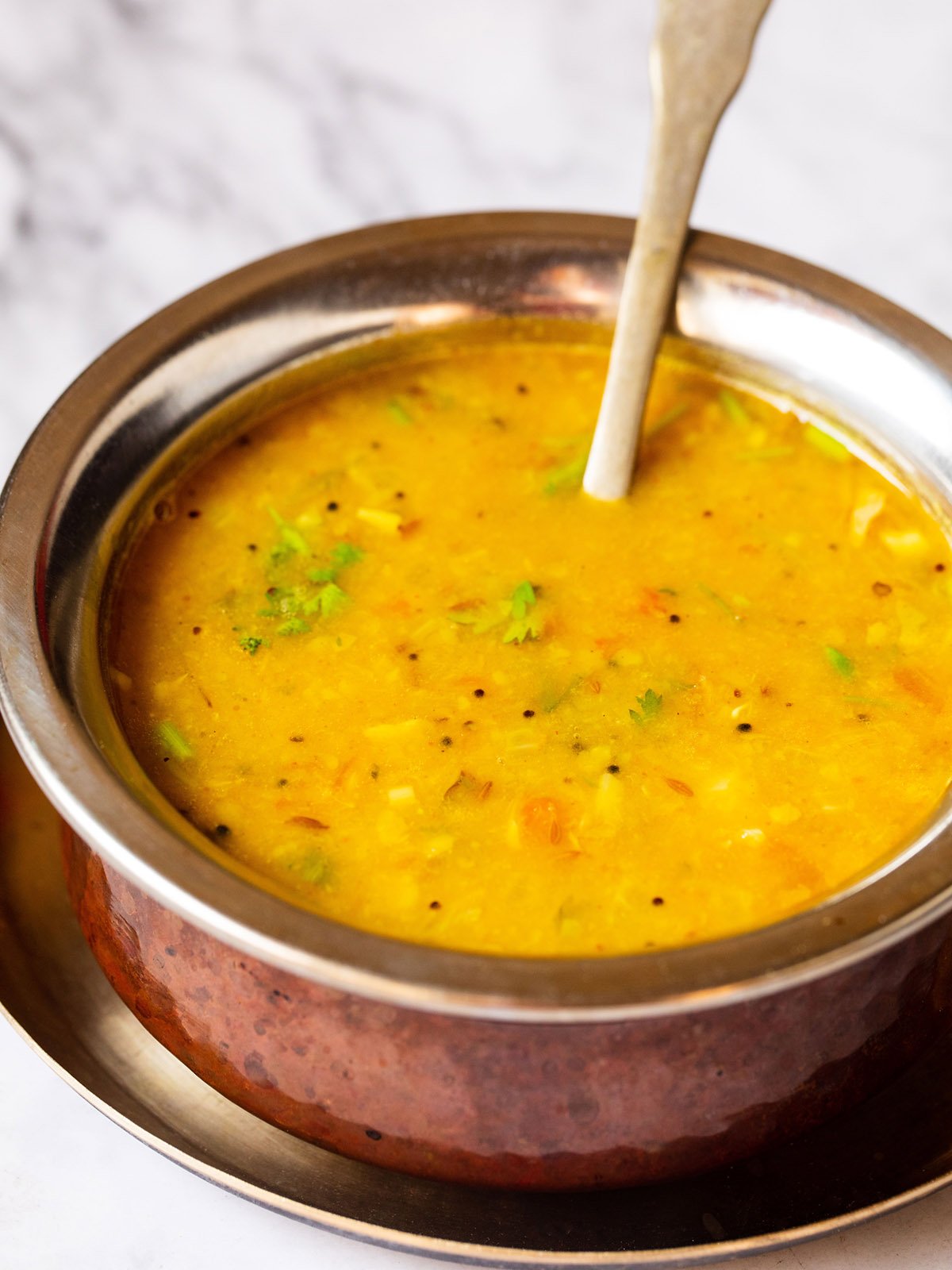
Serving Suggestions
- Roti is a round flatbread popular in India, and a staple bread that is served with lentils or curries. Soft roti tastes great with piping hot dal.
- Naan, a leavened flatbread made in some countries in Asia, is not as much of an Indian household staple as roti, but it is still a deliciously soft and slightly chewy side option.
- Steamed rice always goes great with dal recipes, and you can make it in the pressure cooker or instant pot to save cook time.
- Jeera Rice, which is a simple yet delish cumin flavored rice is a fabulous option to serve with Dal Fry.
Expert Tips
- Consistency: You can alter the consistency of dal by adding less or more water. If you prefer a thinner consistency, then increase the amount of water a bit and not too much. If dal becomes thin or runny, the flavors will get diluted and it won’t taste good. Keep checking and if needed, add more water.
While serving with rice we keep the consistency to medium. When serving with roti or phulka we keep the consistency slightly thick. On cooling the dal will thicken a bit. - Fats: Dal Fry always taste better with ghee. But you can make it with oil or butter. Use sunflower oil, safflower oil, peanut oil, mustard oil or coconut oil. Note that mustard oil and coconut oil will give their taste and flavor in the lentils – so add according to your preferences.
- Smoky flavors: For more restaurant style flavors, you can smoke the dal using the dhungar method, I have described in my Dal Makhani recipe. Alternatively, use smoked paprika in place of red chilli powder or cayenne to get a faint smoky flavor.
- Lentils: You can make this Dal Fry recipe with moong dal (yellow mung lentils), chana dal (Bengal gram) and masoor dal (red lentils), or you can opt for a combination of these. Ensure that the lentils are in their shelf period and are not aged or old. If possible, try to use unpolished lentils.
- Cooking lentils in a pan: Simply soak the lentils for an hour or two and drain the water. In a pot or pan, add water and turmeric powder. When the water comes to a boil, add the lentils and cook in an open pan or pot.
The layer of the frothy scum which is formed when cooking, needs to be removed with a spoon. Simmer until the lentils are tender and softened. For about 1 cup of dal, you can use 3 to 4 cups water.
Tur dal takes longer time to cook than other dals. Depending on the quality of the tur dal, it should take about 40 minutes to an hour to cook.
FAQs
For a less spicy recipe, add less red chili powder and green chilies. You can always adjust the spices according to your taste.
To make a gluten-free recipe, simply skip the asafoetida (hing) or use a gluten-free asafoetida.
Yes, you can definitely double or triple this recipe. But when doing so, remember to add the spice powders, asafoetida (hing) and dried fenugreek leaves (kasuri methi) using the method of approximation.
Certainly, you can omit the curry leaves and ginger-garlic paste from this recipe.
More Indian Lentil Recipes To Try!
Dal (Lentils) & Legumes
Dal (Lentils) & Legumes
Dal (Lentils) & Legumes
Dal (Lentils) & Legumes
If you’ve tried this recipe, please rate it in the recipe card or leave a comment below – I’d love to hear your feedback. For more vegetarian inspiration, sign up for my email updates or follow me on Instagram, Youtube, Facebook, Pinterest or X.
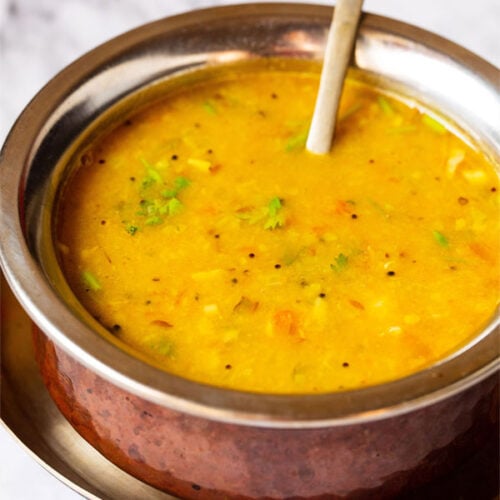
Dal Fry Recipe | How to make Dal Fry
Ingredients
For pressure cooking lentils
- ½ cup pigeon pea lentils – hulled and split, (tuvar dal, arhar dal, toor dal) or ¼ cup each of masoor dal and toor dal
- 1.5 cups water – for stovetop pressure cooking
- 1 pinch turmeric powder (ground turmeric)
Other ingredients
- 2 to 3 tablespoons oil (neutral flavored) or unsalted butter or ghee (clarified butter)
- ½ to ¾ teaspoon mustard seeds (black)
- 1 teaspoon cumin seeds
- ⅓ cup onions – finely chopped, or 1 medium-sized
- 1 to 1.5 teaspoons Ginger Garlic Paste or 1 inch peeled ginger & 3 to 4 medium peeled garlic cloves crushed in a mortar-pestle
- 2 green chilies – slit or chopped
- 2 to 3 dry red chilies – kept whole or halved and deseeded, optional
- 10 to 12 curry leaves
- 1 to 2 pinches asafoetida powder (hing) – for a strong asafoetida, just one pinch is enough
- ½ teaspoon turmeric powder (ground turmeric)
- ½ teaspoon Red Chili Powder or cayenne pepper or smoked paprika
- ⅓ to ½ cup tomatoes – finely chopped, or 1 medium-sized
- 1 to 1.5 cups water or add as required
- salt as required
- 1 teaspoon dry fenugreek leaves (kasuri methi)
- ¼ to ½ teaspoon Garam Masala
- ½ to 1 teaspoon lemon juice – optional
- 2 to 3 tablespoons coriander leaves – chopped, (cilantro) – for garnish
Instructions
Cooking lentils
- Take tuvar dal (arhar dal or pigeon pea lentils) or half-half of tuvar dal and masoor dal (pink or orange lentils) in a colander or sieve.
- Rinse the lentils in water three to four times. Drain all the water.
- Then add the lentils in a 2- litre pressure cooker. Add a pinch of turmeric powder (haldi) and 1.5 cups water.
- Pressure cook the lentils for 9 to 10 minutes on a medium heat until they are softened thoroughly.
- Once the lentils are cooked, then mash them lightly with a wired whisk or with a spoon and set aside.
Sautéing onions, tomatoes, spices
- In another pan heat oil or ghee or unsalted butter. Add the mustard seeds and let them splutter.
- When you hear the spluttering sound of the mustard seeds, add the cumin and fry them.
- Add the onions and sauté stirring often until they become translucent or light brown.
- Now add the ginger-garlic paste and sauté for some seconds or until their raw aroma disappears.
- Add the green chilies, red chilies, curry leaves and mix well.
- Add all the spice powders – turmeric powder, red chili powder, asafoetida powder. Stir and mix again.
- Add the tomatoes and cook until they soften and you see oil releasing from the sides of the masala.
Making dal fry (stovetop)
- Now add the cooked and mashed lentils. Mix thoroughly. Add water, salt and mix again.
- Simmer for 4 to 5 minutes more or till you get a smooth and slightly thick consistency, stirring at intervals.
- Dal fry is not thin and is usually has a medium to thick consistency. So you can adjust the amount of water you want.
- Keep the dal to a medium consistency if you prefer. Making it very thin will dilute the flavors.
- Lastly crush the kasuri methi in the palms of your hands and add. Then add garam masala powder. Simmer for a minute. Switch off the heat and add chopped coriander leaves. Add lemon juice if you want, at this stage and stir well.
- You can garnish dal fry with some more coriander leaves while serving.
- While serving top it with some ghee or butter if required.
- Serve dal fry hot with steamed basmati rice, biryani rice, jeera rice or saffron pulao. It also goes well with roti or naan.
Instant Pot Dal Fry
- Press the sauté button of your IP. Let the display show hot. Add ghee or oil in the steel insert.
- Add the mustard seeds to the hot oil or melted ghee and let them crackle first. When you heat them crackling, add the cumin seeds and let them splutter.
- Then add the chopped onions and sauté stirring often until they soften.
- Add ginger-garlic paste and sauté for a few seconds.
- Stir in the curry leaves, dry red chillies and green red chillies. Again sauté for a few seconds.
- Add chopped tomatoes and sauté them until they soften.
- Next add the turmeric powder, red chilli powder and asafoetida and mix well.
- Add the rinsed lentils and 1.5 cups of water. Deglaze removing any ingredient bits stuck to the bottom of the steel insert. Season with salt as needed.
- Secure the lid of your IP and position the steam release handle to sealing. Press the pressure cook/manual button, setting the time to 15 minutes on high pressure. It may take 10 to 15 minutes for the lentils to cook depending on their age and quality. For a dal fry, the lentils have to be softened nicely.
- When you hear the beep after the pressure cooking is done wait for 10 minutes and then do a quick pressure release.
- Lightly mash the cooked lentils. If you find that the dal has become thick, add some hot water to thin and lighten it up. If the dal is thin for your liking, press the sauté button and simmer for a few minutes.
- Lastly add the kasuri methi, garam masala powder and coriander leaves. Mix and switch off your IP. Serve dal fry hot or warm.
Video
Notes
- Lentils: You can also make dal fry with moong dal (yellow mung lentils), chana dal (bengal gram) and masoor dal (orange lentils) or you can opt for a combination of these three lentils.
- Cooking lentils in a pot or pan: Rinse and soak the lentils in water for thirty minutes to an hour. Later draining all the water using a sieve or colander, add the lentils in a wide enough pot or pan. Pour 2 to 2.5 cups of water with 1 teaspoon oil and cook on medium heat with or without lid until the lentils are softened. Keep checking and if needed, add more water.
- Consistency: For a thicker dal, add less water. For a slightly thinner consistency, add a bit more water. But do not make the it very thin as it will dilute the flavors.
- Spicing: For a less spiced dal, add less chilli powder and green chillies. For a spicy tasting dal fry, increase the amount of red chilli powder and green chillies.
- Fats: Dal fry always taste better with ghee. But you can make it with oil or butter. Use sunflower oil, safflower oil, peanut oil, mustard oil or coconut oil. Note that mustard oil and coconut oil will give their taste and flavor in the lentils – so add according to your preferences.
- Gluten-free version: To make a gluten-free recipe, simply skip the asafoetida (hing) in the recipe or use a gluten-free asafoetida.
- Smoky flavors: For more restaurant style flavors in your dal fry, you can smoke the dal using the dhungar method, I have described in my Dal Makhani recipe. Alternatively, use smoked paprika in place of red chilli powder or cayenne to get a faint smoky flavor.
Nutrition Info (Approximate Values)
This Dal Fry recipe from the blog archives was first published in August 2009. It has been updated and republished on April 2024.
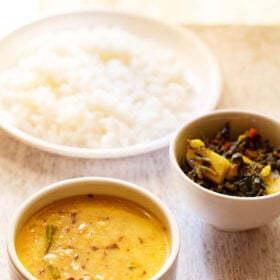
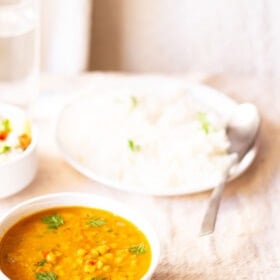
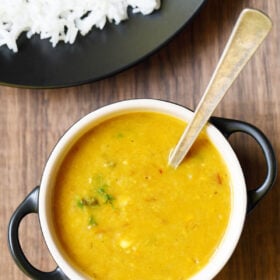
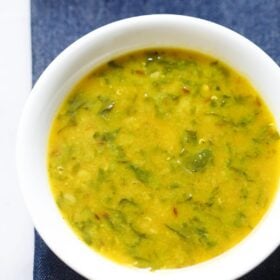
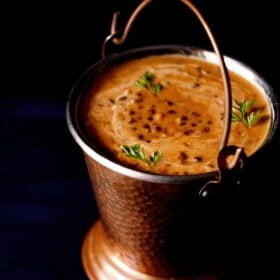
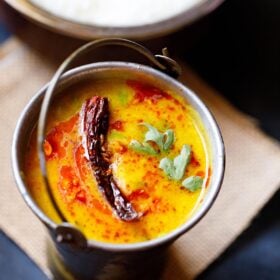
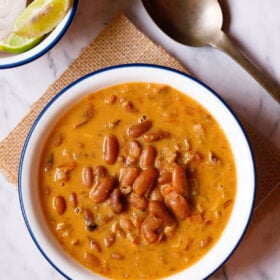
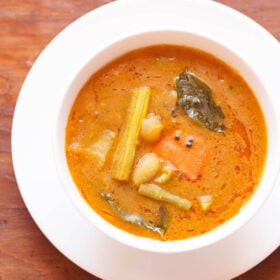








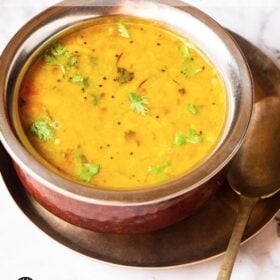
Made this as written. It is an excellent flavorful Dal. Thanks for the easy recipe
Thank you so much. Happy to hear you enjoyed the dal and found the recipe easy to follow.
This is my favorite dal recipe. First time I followed exactly and loved it!
I have come to like using additional amounts of ginger, double tomato, a bold amount of hing, Kashmiri red chili powder, extra fenugreek leaves, and have learned that the lemon juice is really important.
I am going to find your explanation of the dhungar smoking method and try that. This is such a treat – having this kind of authentic Indian dal at home.
I grow a curry leaf plant at home as I find that it is key.
Thank you for sharing your expertise…
Great and thanks a lot. Thanks also for sharing your variations. The dhungar method imparts a lovely smoky flavor to the dal. But to some extent the same smoky flavor can be got by using smoked paprika, instead of kashmiri red chilli powder or cayenne pepper.
I tried many Dal recipes and this is by far the best Dal fry recipe I must say.
Thank you
Thanks a lot and glad! Most welcome.
Love your recipe…
Made it several times and always enjoyed by family and guests
Thank you so much
Great and thanks for sharing. Glad to know.
i never seen detailed instruction in any other cooking website. showing us 3 ways of cooking helps a lot. sometimes no pressure cooker changed whole dinner menu. very helpful! thank u!
Thanks a lot and welcome.
Loved the recipe! The dal turned out so tasty. Yum! Thank you so much 😀
Wonderful and thanks a lot for taking the time to comment and rate the recipe.
Love the taste!
Absolutely authentic recipe! It was so so tasty! THANK YOU!
Thank for the feedback and rating. Glad!
Awesome recipe. I tried it and my family loved it. Very tasty.
thanks a lot swati. glad to know and thanks for sharing this.
I tried making it.It became super delicious.Thank you!
Welcome Nivedita
Another awesome recipe.Turned out absolutely delicious.Loved it.
thanks winnie.
Absolutely delicious! Will certainly make this again, and add to my favourites 🙂